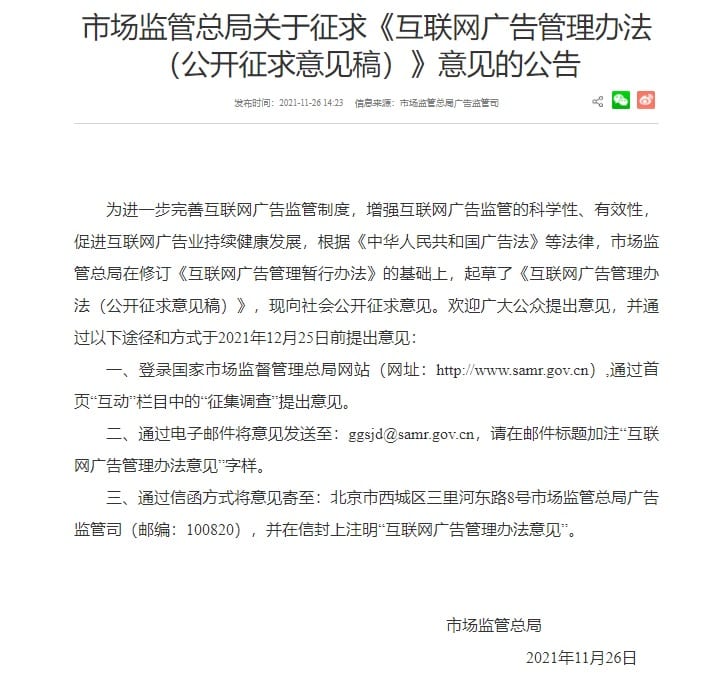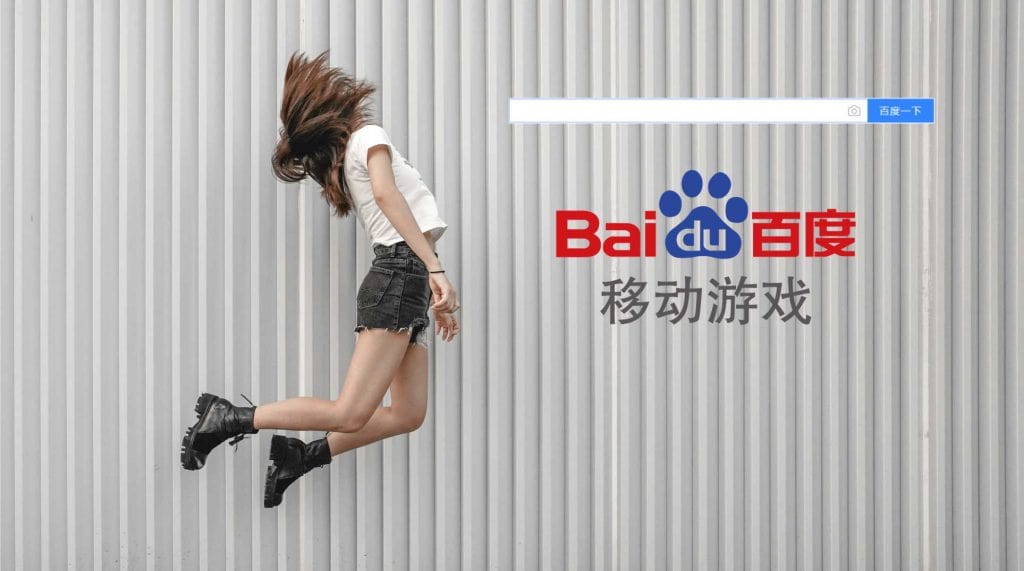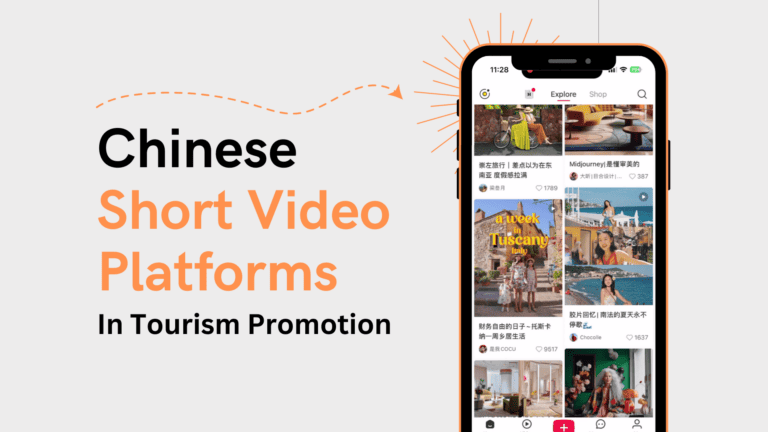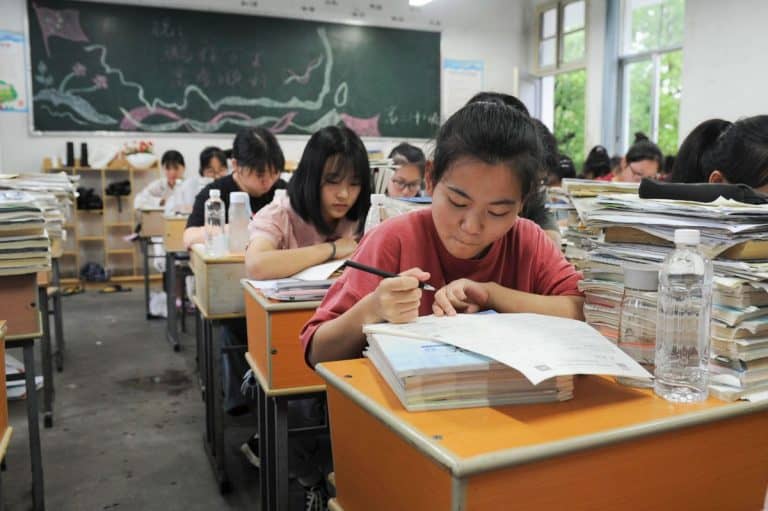New Advertising Law in China: regulation of online Marketing
2022 China’s online advertising will be under greater scrutiny as authorities update existing regulations.
China’s market regulator, State Administration of Market Regulation (SAMR), has revised its online advertising guidelines, ” Interim measures for the Administration of Internet Advertising” (the Intermediate Measures), in order to improve supervision of internet advertising.
Due to the constantly changing nature and scope internet advertising, the Interim Measures no longer fit today’s needs. The draft Measures to Manage Internet Advertising (the draft measures) is now available for public comment, December 26, 2021.

According to the SAMR, the new regulation will regulate online advertising and promote its healthy development while protecting consumers’ rights.
Concerns have been raised about the potential monopoly of large internet companies and infringement. China has begun to regulate the digital marketplace by increasing surveillance and penalities. Internet platforms are expected to have greater responsibilities for internet advertising compliance.
If you need a advertising agency, we can help you.
We are smart and unexpensive
Email us to have an idea of our innovation solution and pricing.
China’s new regulation of online advertising 2022
Modifying the scope of Internet Marketing
The Internet is the most important mass media in daily life. Because of the nature of internet information – high quantity, rapid change and large influence – identification is more important than traditional forms advertising. In practice, however, it is not uncommon to find that internet advertising companies fail to identify their advertisement information as ‘advertisement’, or mislead consumers using the content format of appraisal, recommendation, or advertorial.
It clarifies that advertising should be clearly identified in the promotion and sale of goods and services via the internet, including bidding ranking, news reports and experience sharing.
Clarifying the rules for pop-up ads in China
The draft Measures also include rules for embedded and pop-up ads. The draft Measures include information about the format of pop-up ads (e.g., internet ads that are published as start play, video interstitials or pop-ups).
It also includes a list of prohibited actions for advertisers such as:
- There is no closing sign and can be closed only after counting down
- The closing sign is either false, or it cannot be identified clearly or positioned
- Close a single advertisement by clicking twice or more times
- After closing an ad, you can open another ad while browsing the same page.
- Other behavior that affects one-click closure
It also states that online advertising must not be used to lure users into clicking on misleading or deceitful advertisements.
Advertisers are responsible for any administrative sanctions if they violate the prohibited actions. Advertisers and advertising agencies are jointly liable for misleading users and entice them to click.
Read more
Clarifying
Draft Measures clarify that “online advertising publisher” can be defined in the same way as traditional advertising publisher. It removes the requirement to “check advertising content” or “decide on advertising release” in order to be considered an online advertising publisher. Instead, recognition of an online publisher is contingent upon “publishing and showing”.
The draft Measures also attempted to define “internet service provider” as outlined in Article 3.
Eliminating the programmatic buying provisions
The Interim Measures require that online advertisements published using “programmatic buying” must clearly identify the source. Publishing online advertising in the manner of programmatic purchasing means that the advertisement must be targeted by using the information integration, data analysis and other services offered by the advertising demand side platforms, media-side platform, and the advertising information exchange platform. Online advertising publishers and agencies are called advertising demand-side platforms operators.
Programmatic buying is considered a business model for online advertising by the authority in charge. Programmatic buying doesn’t create new players in the online advertising market, and therefore has little impact on the content of advertisements. It is also believed that programmatic buying liability is too low for online platforms, which makes it difficult to regulate online advertising. This draft Measures has therefore removed the programmatic buying provisions.
Here’s a list of prohibited advertising content
There are 17 prohibited advertising contents among the 31 articles included in this draft Measures. While some of these prohibited provisions were already in the Interim Measures’, others are new.
- Some Measures prohibit online advertising for prescription drugs or tobacco.
- Advertisements for medical treatment, drugs or formula food for special medical uses, medical devices, pesticides and veterinary drugs, as well as health food, shall not be published without careful scrutiny. This is in accordance with the Interim Measures. The draft Measures also stipulate that advertisements for medical treatment, drugs or formula food for special medicinal use, medical devices, and health food should not be published via live steaming.
- The prohibition of online advertising for off-campus training in primary and secondary schools, kindergartens and other educational institutions is part of the Draft Measures. This new rule was proposed by the draft Measures and has yet to take effect.
- Draft Measures require that ads aimed at minors be banned. This could be detrimental to their mental and physical health. Online games, cosmetics, and medical treatments will all be targeted.
- Draft Measures also prohibit publication of advertisements without verification. Advertising agencies and publishers should verify patent numbers if the advertisement is about a patented product.
Other changes are also noticeable
Platforms will be required to set up systems for reviewing and registering ads and advertisers. It is necessary to keep records of all advertising activities and update them regularly. Statistics information must also be available in a timely fashion.
Platform operators need to take steps to stop illegal advertisements that encourage criminal activity or contain malicious code. Platforms should also establish mechanisms to handle complaints about advertisements.
Advertisements cannot be placed where people are looking for government services websites.
further reading about ads Trends in China
A larger background and potential impact
In 2021, Chinese authorities increased regulations in multiple industries.
The technology sector was particularly affected.
Since November 2020, when China stopped the IPO of Ant Group (Ant Group’s financial arm), regulators have been trying to address a long-standing problem in the tech sector, particularly the so-called platform economy: anti-competitive practice.
After a four month anti-monopoly investigation, Alibaba was eventually fined RMB 18 billion (US$2.77billion). Other internet conglomerates, including Tencent and Baidu, ByteDance and Didi Chuxing, were also fined following an anti-monopoly investigation. Foreign-invested companies (FIEs) and smaller internet firms were also fined. In April, for anti-competitive conduct, Sherpas, an English-language takeout site, was fined US$178,000.
A number of anti-competitive behavior, including forced exclusivity agreements (also known by ‘pick one form two’), cash-burning strategy to gain market share, unapproved M&A activity, false advertising and deceptive or unfair pricing, were targeted.
Antitrust regulation
China launched an antitrust bureau to conduct antitrust investigations, oversee M&A activity, and monitor market competition as part of its campaign.
China’s cyberspace regulator released draft rules in September 2021 for companies to use algorithmic recommendations. These rules were based on new rules regarding unfair competition and data use.
The government is also reducing the burden on students by limiting their access to campus education. This will promote educational equity and reduce student workload. They are also tightening surveillance over the unchecked growth in the medical beauty industry.
It is not surprising that Tencent shares fell by 0.5 percent just after the draft rules were published. Meituan’s shares fell by one percent. The new regulations may result in a temporary decrease in advertising sales for tech giants like Baidu and Tencent.
The draft Measures, which aims to implement relevant rules about online advertising in both the Advertisement Law (and the E-commerce Law), signals the beginning of an era of strong regulation for online advertising. source China Briefing.
Advertisers, i.e. individuals or businesses who wish to promote their products or service through advertising, and any other parties involved in online advertising should be aware of the new prohibitions and additional compliance requirements. They can make adjustments to minimize potential risks.
All platforms must adhere to the same advertising standards when it comes to TV ads and Baidu advertisements. This blog will discuss the most important rules that companies should keep in mind when developing their China advertising strategy.
Banned Industries in China
Although advertising is prohibited in certain industries, there are restrictions on the different platforms.
Advertisements for businesses involved in the following activities have been banned by the government:
- drugs;
- Sex/ Obscenity / Pornography;
- Gambling;
- Superstitions;
- Terrorism;
- Violence.
Restrictions for Baidu

Some might consider Baidu’s restrictions more restrictive than those of the government. China’s most popular search engine bans publication of advertisements for businesses in these industries.
- Instruments and apparatus for medical purposes;
- Health and medical treatment
- Healthcare products;
- Auction houses
- Opportunities for franchises
- Healthcare products;
- Products for sex.
General market Regulations in China
Most of the regulations will be familiar because they are similar to international regulations. These regulations must be adhered to by the ads:
- If data, quotes, and survey information are used, they must be accurately represented and sourced.
- Advertisements promoting patentable products or methods must include both the patent number as well as the type of patent.
- It can’t criticise other operators, competitors or their products or services.
- It must be easily identifiable as an advertisement.
- It can’t be in news reports.
- To enable one-click closing, pop-up ads online must be clearly marked.
Advertisements cannot be sent or placed at homes, vehicles, or any other personal property unless consented to. Advertisements via email must comply with the same rules. However, emails must include contact information and real identity. Emails in China must allow recipients to unsubscribe.
Advertising in China: Regulated Industries
Alcohol & Tobacco in China
Globally, regulations regarding the advertising of alcohol are well-established. China may have restrictions that are more stringent than others.
China’s advertisements for alcohol cannot promote or show the consumption of alcohol. The ads cannot feature any activities that are dangerous when drunk, such as driving cars, boats, or planes.
Advertisements cannot be relied upon to imply relaxation, anxiety-reducing, and/or improvements in physical strength.
Read more about alcohol market in China
Advertisements for tobacco products are subject to some of the most stringent restrictions in the country. It is effectively banned. Advertisements for tobacco products (including its trademarks, packaging and name) are not allowed in mass media, public places or public transport. Advertisements relating to tobacco products cannot be targeted at minors or received by them.
Notifications that are required, such as job postings or relocations, must not include any identifiable features, including the name, of the product.
Healthcare / Medical
Except for narcotics and prescription drugs that are to be used only by doctors, the advertising of these drugs can only be done in designated medical and pharmaceutical publications.
Advertisement of any other special drugs, such as narcotics, toxic drug for medical use, radioactive substances, and other drugs that are not intended to be used by doctors, is prohibited.
Advertisements for products and services, including beauty, medical equipment, and online games, that could have an impact on the mental or physical health of minors, cannot be published in mass media.
Investments/Finance/Real Estate
Investors can expect a return of investment for products or services. This means that investors need to be aware of the risks and responsibilities.
Advertisements cannot implicitly or explicitly promise any results, capital preservation or other circumstances, unless the state gives it. The ad must not feature any names or images of academic institutions, industry organizations, professionals, beneficiaries, or other means to recommend or certify the product or service.
Real estate in China must be accurate and true to the property area. It should clearly state the building area and the area within the apartment. The following information must not be included:
- Investments are guaranteed to return
- Property appreciation guarantee;
- Violations to the state’s price control regulations
- Marketing information that is misleading about transportation time or facilities, cultural, educational, and planned facilities among other things.
Education(the big crackdown)
To better protect students against predatory advertising in relation to their education, the advertising law stipulates that ads for education-related businesses cannot include the following content:
- Implicit or explicit guarantees of future results, such as passing exams, entering higher education and earning a degree.
- Implicit or explicit declarations that test-setting staff or examination institution personnel have completed the education or training program;
- Names and images of all scientific research units, educational institutions, professional organizations, beneficiaries, etc., to recommend or certify the program.
Celebrity endorsements
<iframe src="https://www.linkedin.com/embed/feed/update/urn:li:share:6878801810384064512" height="750" width="504" frameborder="0" allowfullscreen="" title="Embedded post"></iframe>To get a celebrity to endorse products or services, they must have used the products or services first before making any comments about them. It is possible that you will have to offer your products or services directly to the celebrity.
You will need to ensure that your spokesperson has not made false statements in the past, and that if they have they have been administratively penalized for at least 3 years before they are appointed.
False advertising can lead to a person pledging their support without having actually tried the product. Important to remember that spokespersons cannot be under 10 years old.
Restrictions on advertising to children
Pre-tertiary schools are not allowed to allow advertising except for public service ads. This is done in order to protect children against predatory advertising. Anything that is used to support or perform pre-tertiary education (e.g. stationery, school buses and textbooks) is not permitted to include or disguise advertising.
Advertisements that could harm their mental or physical health cannot be targeted at minors outside of schools. Advertisements that are targeted at minors under 14 years old cannot encourage unsafe behavior or encourage them to ask their parents for the product or services.
Restrictions on “Content”
There are many restrictions that apply to the content that can be used in ads regardless of platform. These are not allowed to be displayed on ads:
The use of, or the disguising of, the national flag or emblem, army emblem, emblem, or military song of China’s People’s Republic of China.
The use or disguising of names and images of state organizations or their staff;
Anything that would damage the dignity of the state or reveal its interests or secrets;
No words that suggest superiority to other brands or organisations, such as “state level”, “highest-level”, and “best”, are allowed.
It is against the law to publish content that could harm public order or social customs.
Anything that exposes or endsangers personal information or impacts the safety or security of people or property.
Obscenity, gambling, ponographic, and superstitious; or violence.
Content that is sex-, racial-, religious-, or ethnically discriminatory
It is prohibited to promote or harm the environment, natural resources or protection of cultural heritage.
Any other content that is prohibited by law.
A example of ads campaign in China
If you need a professional agency for your advertising campaign in China?
Contact us







